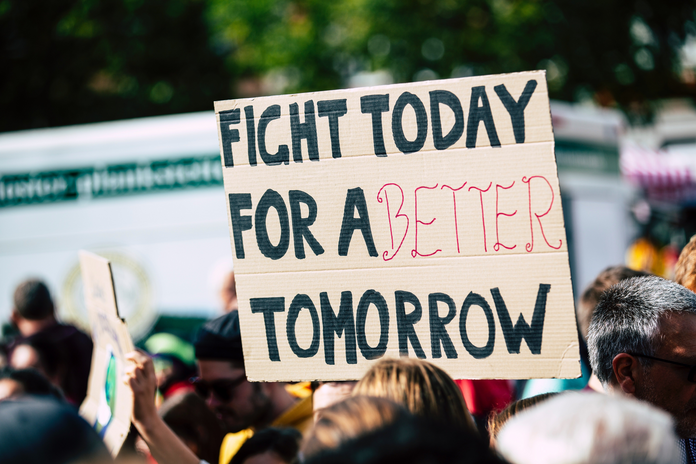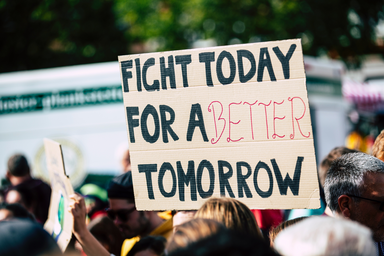In college, there are boundless opportunities to get involved in political activism. If you want to help make a difference on a local, state or even national level, there are petitions to sign, organizations to join, on-campus volunteering — and that’s just to name a few! But after graduation, it can get a lot harder to stay involved and aware of these opportunities. You have to make an effort to seek out ways to make a difference rather than walking by those opportunities on your way to class.
After I graduated from my undergraduate program and switched to an online program for graduate school, I found myself reaching out to local campaigns and political groups, desperate for something that would let me feel like I was working to forge a better future for this country. In the past several months since graduating, I’ve been involved in a variety of forms of political activism, from phone banking to text banking to digital organizing (activism that takes place on social media) and everything in between. Below, I’ve broken down the pros and cons of each type of organizing, along with ways you can get involved and scratch that political activism itch. Best of all, most of these options don’t even require you to leave the house!
- Phone banking
-
Let’s start with one of the best-known types of political organizing: phone banking. When you sign up to phone bank, you’re responsible for calling potential voters to chat about a wide variety of topics. You might end up calling registered Democrats to encourage them to vote by mail, or helping unregistered voters get registered over the phone. Other phone banks involve calling voters about specific candidates or issues that you want them to support.
Phone banking may sound intimidating — and as someone who hates talking on the phone, believe me, I get that — but it’s not nearly as bad as it sounds. I’ve found that the vast majority of conversations I have are positive, and even if the person I’m calling doesn’t agree, they’re usually polite about it. You don’t have to use your personal phone number, so there’s no chance of anyone calling you back or contacting you after a shift. In the wake of the COVID-19 pandemic, most phone banks take place over Zoom calls, where volunteers come together to make calls in a group environment. That way, you can ask for help (or just rant about a bad call) with fellow volunteers in between your calls!
- Text banking
-
If you’re not sold on the idea of speaking to voters one-on-one, maybe text banking is more your speed! Text banking is very similar to phone banking in terms of the conversations you’ll have and the voters you’ll talk to, but you’ll do it all via a texting application — usually on your computer — instead. Just like phone banking, that means your personal number will remain private, so you don’t have to worry about trolls or anyone you don’t know contacting you. Most local and state political campaigns and organizations offer text banking, including NextGen America, where you can easily sign up for shifts nearly any day of the week.
In my experience, I find conversations over the phone to be a little more productive than those over text, probably because they feel more personal. Also, people often tend to assume text banking messages are from bots, which means you may get more than a few rude replies from people who don’t know a person is on the other side of the line. However, text banking is great for reaching younger voters who are less apt to pick up the phone, and it lets you reach a large number of people in a very short amount of time, too!
- Digital organizing
-
Like phone and text banking, digital organizing involves contacting voters about voting or about specific political issues. However, instead of calling or texting them, you’ll be reaching them on social media! If you’re a big user of Instagram or Twitter, this is a great way to use your platform for good. Unlike phone or text banking, digital organizing is usually something you do on your own time, so you can customize the experience to fit whatever political issues you’re particularly passionate about.
In a typical digital organizing session, I use Instagram or Twitter to find accounts of people who I think would be supportive of whatever cause I’m reaching out about. For example, if I’m sending a link to pledge to vote in this year’s election, I might look through accounts that follow local political organizations on Instagram. Once I’ve found someone, I send them a DM introducing myself and asking them to pledge, sign a petition, register to vote, etc. As someone who feels very at-home in the digital realm, this is my personal favorite kind of organizing!
- Letter writing
-
If one-on-one conversations aren’t your cup of tea, writing letters or postcards is a great option for you! Both national organizations and local campaigns offer letter writing opportunities, and on top of supporting a cause you believe in, you’ll be supporting the post office, too. For voters who are on the fence, receiving a handwritten note could very well be the thing that makes a lasting impression. You can even get creative with it — I have way too many stickers for decorating letters and envelopes than I’ll ever need now.
My personal favorite organization to write letters for is the Sierra Club. They provide you with all the materials you need, including addresses, a pre-determined send date, and custom pages that you can print and write your letter on. There are even virtual letter-writing parties that you can attend!
- Canvassing
-
While most of the above options don’t require you to leave your house, canvassing is a little different. Under normal circumstances, a canvass would involve going door-to-door to talk to voters in-person, usually to ask them to support a specific candidate. In the wake of the COVID-19 pandemic, however, the vast majority of canvassing is no-contact, which means you’ll likely be dropping off campaign literature at voters’ doors instead of having conversations with them.
Canvassing is a highly effective way to mobilize voters — a study by Yale University found that it increases turnout by about six points, which is more than enough to make a difference in a race. The best way to get involved is to reach out to local races and volunteer for a candidate that you’re passionate about. Nearly every campaign offers canvassing, so you won’t have to look far!
Whatever organizing option(s) you choose, you deserve to feel proud of yourself! It’s easy to feel down in the dumps — especially after a series of bad phone calls or texts — about whether or not you’re making a difference. Take comfort in the fact that you’re doing anything at all to fight for change. With the November election drawing nearer and nearer, there truly is no such thing as too small of an effort.
If you’re interested in getting involved in political organizing, check out organizations like NextGen America or The Sierra Club. You can also reach out to your local party office to learn about local campaigns that are looking for volunteers. Happy organizing!


